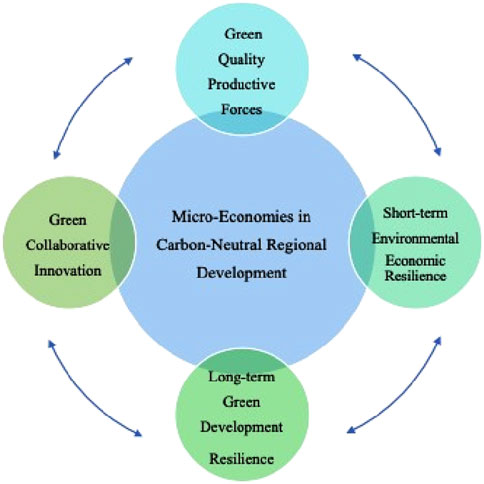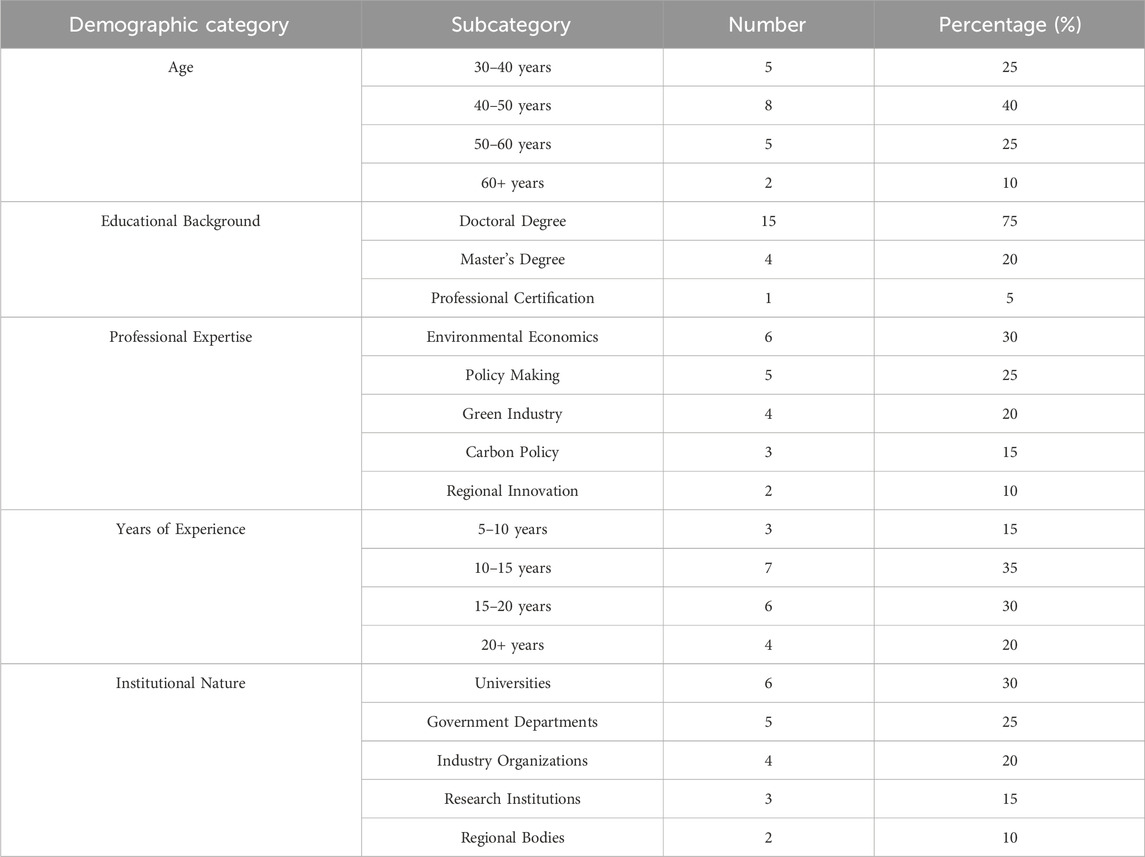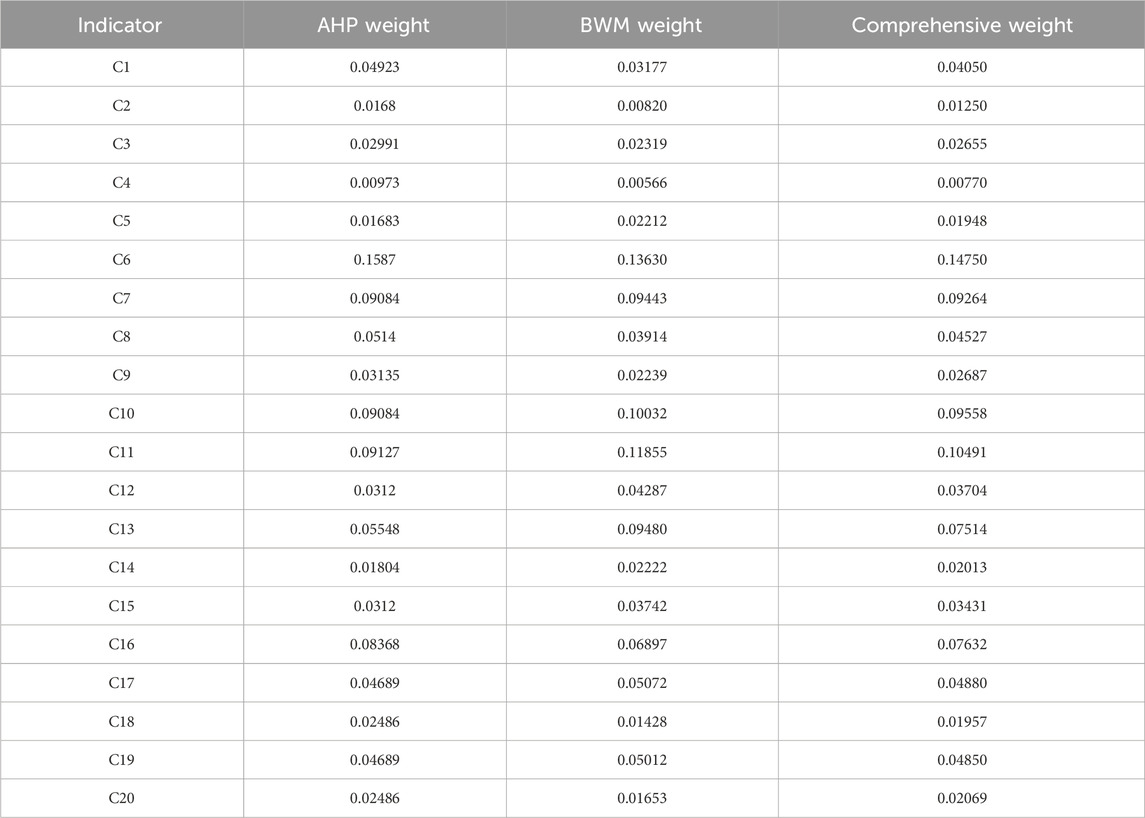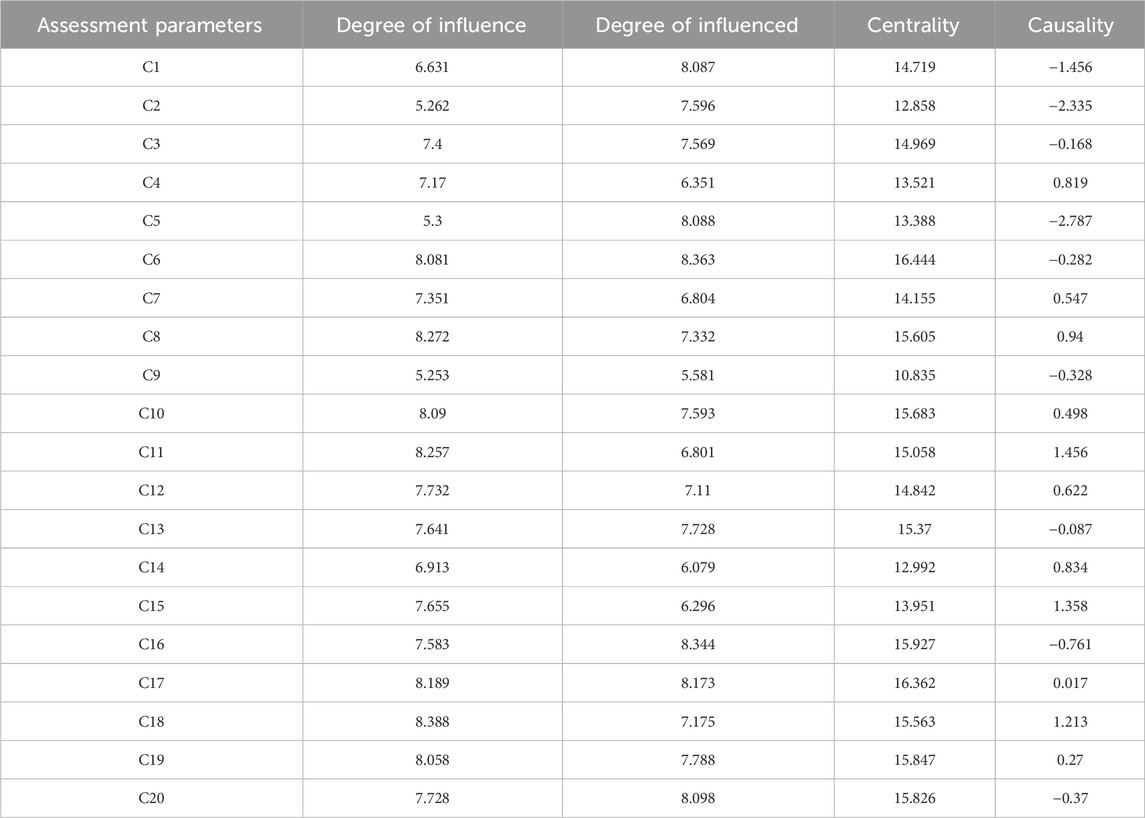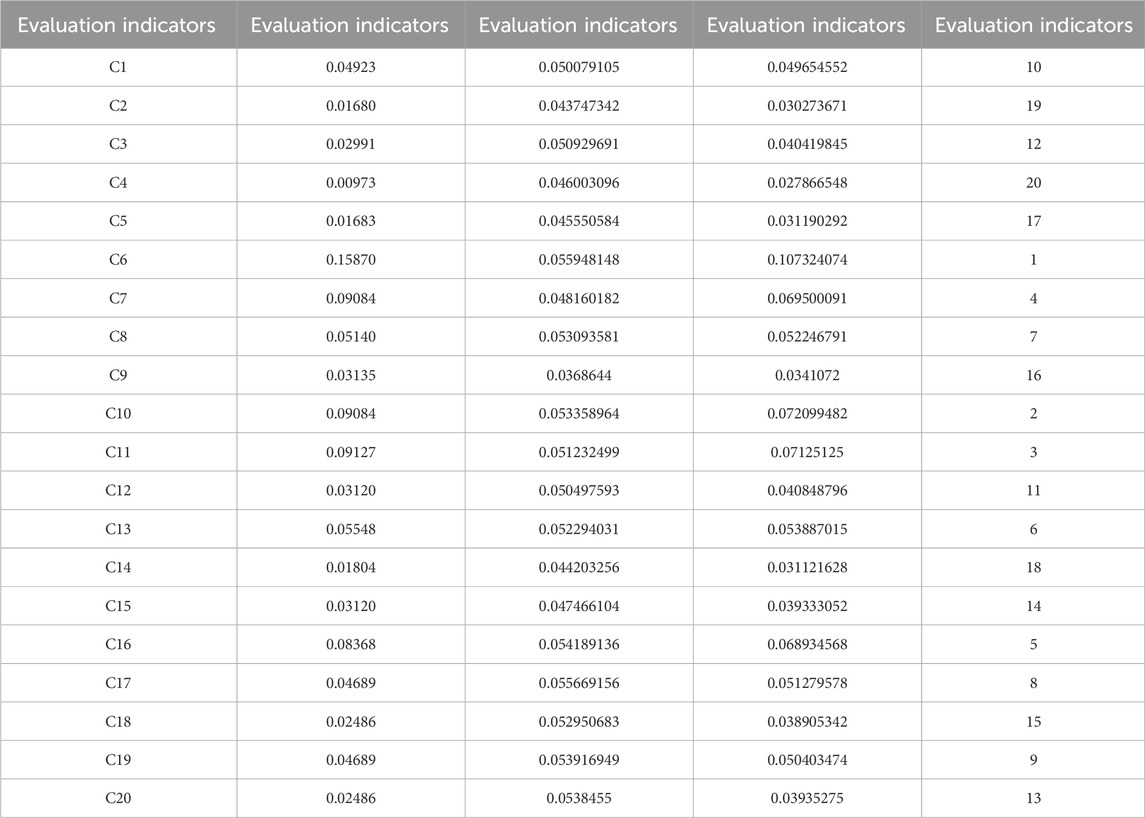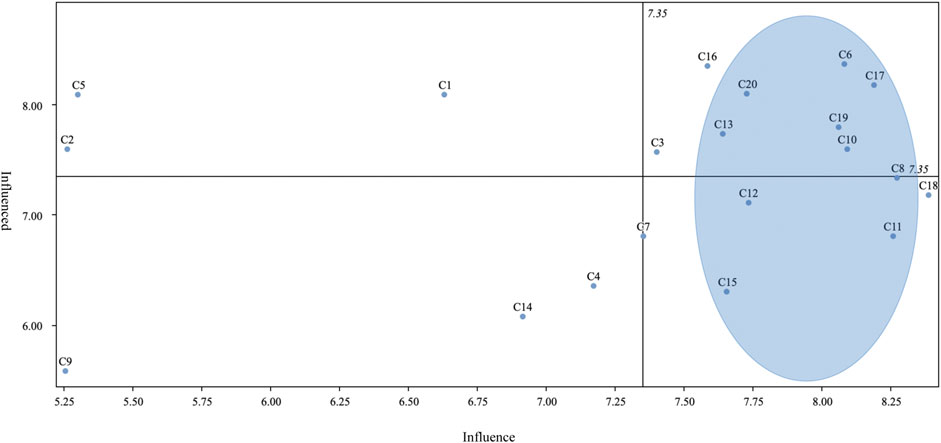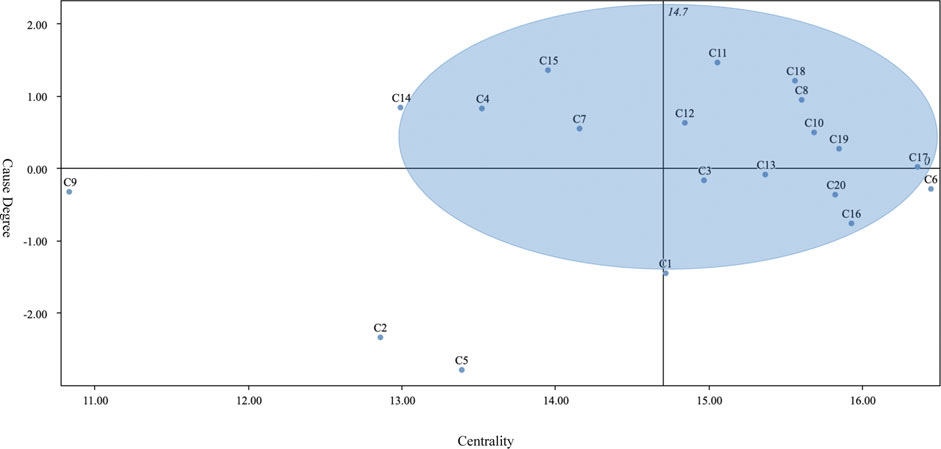- 1Faculty of Humanities and Social Sciences, Macao Polytechnic University, Macao, China
- 2Zhejiang College of Security Technology, Zhejiang, China
Global climate change and international carbon neutrality commitments create unprecedented pressures for sustainable transformation. China’s dual carbon goals and Green Quality Productive Forces development strategy require coordinated regional implementation, particularly challenging for gaming-dependent small economies. This study focuses on Macau as a representative case to investigate environmental-economic resilience and green collaborative innovation capabilities under carbon neutrality constraints. The research objectives encompass developing a comprehensive evaluation framework for small economies’ carbon-neutral development, identifying critical transformation factors, and formulating regional green innovation integration strategies. A multi-criteria decision analysis framework integrating AHP, BWM, and DEMATEL methodologies was employed through systematic literature review and expert consultation using Delphi method. Initial weights were determined through AHP pairwise comparisons with consistency verification, while BWM provided robustness validation and DEMATEL quantified inter-factor relationships. Results reveal long-term green development resilience significantly outweighs short-term environmental-economic resilience (0.42312 vs. 0.12252). Green industrial diversification emerges as the most critical factor (0.107), followed by carbon neutrality capacity (0.072) and regional integration coordination (0.071). Methodological triangulation demonstrates stability with correlation coefficients exceeding 0.85. These findings provide theoretical insights into small economy carbon-neutral pathways and practical frameworks for gaming-dependent jurisdictions, demonstrating that structural transformation and strategic regional positioning constitute more effective approaches than conventional policy interventions.
1 Introduction
Macau confronts substantial environmental and economic challenges stemming from its structural carbon intensity and constrained green innovation capacity. As a micro-economy with only 32.9 km2 and approximately 686,600 residents, Macau exhibits distinctive environmental vulnerabilities that differentiate it from larger economies in pursuing carbon neutrality goals. The convergence of carbon neutrality imperatives, innovation network limitations, and environmental-economic resilience challenges creates a complex developmental paradigm requiring systematic analytical frameworks specifically calibrated for micro-economic contexts.
Macau’s economy remains heavily dependent on gaming and hospitality sectors, with gaming revenue accounting for approximately 80% of government fiscal income before COVID-19. This concentration creates specific green transformation challenges, as gaming-related financial services and luxury hospitality operations generate substantial carbon footprints while providing fiscal resources for transition investments. Current initiatives remain limited: Bank of China (Macau) launched green loan products for gaming operators in 2023, while operators like Galaxy Entertainment Group achieved 23% carbon intensity reduction through energy management systems. Recent empirical research on Macau’s carbon reduction pathways reveals both significant challenges and emerging opportunities within the Greater Bay Area framework. Song et al. (2022) identified typical pathways to carbon neutrality for Macau’s urban smart energy systems, demonstrating that the jurisdiction’s compact geographical structure and concentrated energy demand create unique optimization opportunities through integrated renewable energy deployment and smart grid technologies (Luo et al., 2022). However, spatial network analysis of carbon emission intensity across the Guangdong-Hong Kong-Macao Greater Bay Area indicates that Macau exhibits the highest per capita carbon intensity among the region’s major cities, reflecting the concentrated nature of its gaming and hospitality industries Wei and Zheng, (2024). The implementation of carbon emission trading mechanisms presents particular complexities for Macau, as its specialized economic structure requires differentiated approaches compared to the manufacturing-oriented economies of mainland Greater Bay Area cities (Luo et al., 2022; Song et al., 2022). However, comprehensive carbon accounting systems for gaming operations remain absent, highlighting the gap between theoretical green development frameworks and practical transformation requirements in gaming-dependent micro-economies.
Over the past decade, Macau’s annual carbon intensity reduction has been significantly lower than China’s national average, highlighting structural challenges facing this small jurisdiction in achieving dual carbon goals (Cai et al., 2022). The COVID-19 pandemic precipitated unprecedented disruption in Macau’s carbon-intensive micro-economy, with extreme environmental volatility evidenced by substantial carbon emissions fluctuations during crisis years, followed by dramatic rebound as economic activities resumed. This extraordinary environmental-economic volatility underscores the critical interconnections between carbon neutrality pathways, regional innovation networks, and micro-economic resilience mechanisms (Lemke et al., 2023).
This context raises a fundamental research question: How can a micro-economy like Macau develop environmental-economic resilience while fostering Green Quality Productive Forces and participating in regional collaborative carbon-neutral innovation networks? This central question divides into three interconnected sub-questions: 1) What are the relative weights and interactions among environmental-economic resilience, Green Quality Productive Forces, and green collaborative innovation factors in shaping Macau’s carbon-neutral development trajectory? 2) Which critical elements should policymakers prioritize when formulating Macau’s green economic diversification strategy under dual carbon constraints? 3) How can Macau strategically position itself within the Greater Bay Area green innovation ecosystem to maximize collaborative low-carbon benefits while maintaining its distinctive institutional advantages?
This study makes several significant innovations to existing scholarship on micro-economic carbon-neutral development. Firstly, it develops the first integrated analytical framework that systematically connects environmental-economic resilience theory, Green Quality Productive Forces concepts, and green collaborative innovation networks specifically for micro-economies pursuing carbon neutrality. Unlike previous studies that examine these dimensions separately, this research reveals their complex interdependencies and synergistic effects in carbon-constrained contexts.
Secondly, this investigation introduces a novel multi-criteria decision analysis methodology that combines AHP and DEMATEL approaches to quantify both direct and indirect relationships among green development factors in micro-economic systems. This methodological innovation enables systematic evaluation of factor importance while capturing the dynamic interactions that conventional approaches overlook.
Thirdly, the study provides the first comprehensive empirical assessment of how micro-economies can leverage regional innovation networks to overcome internal green capacity limitations while pursuing carbon neutrality goals. By focusing on Macau’s unique position within the Greater Bay Area ecosystem, this research demonstrates how strategic network positioning can compensate for scale limitations in green innovation.
The research objectives are threefold: firstly, to develop a comprehensive multi-criteria decision analysis framework specifically calibrated for micro-economies to evaluate environmental-economic resilience, Green Quality Productive Forces development, and green collaborative innovation potential under carbon neutrality constraints; secondly, to identify critical factors influencing Macau’s green diversification efforts through expert-based empirical analysis; and third, to formulate evidence-based policy recommendations for strengthening Macau’s position within the Greater Bay Area green innovation ecosystem.
This investigation contributes to extant literature by proposing an integrated assessment model tailored to micro-economies that interconnects environmental-economic resilience, Green Quality Productive Forces, and green collaborative innovation networks, thereby offering both theoretical insights and practical applications for carbon-neutral development of micro-economies within regional green economic integration frameworks.
2 Theoretical foundation and literature review
To address these questions, this study develops a multi-criteria decision analysis framework integrating three theoretical traditions—environmental-economic resilience theory, Green Quality Productive Forces concepts, and green regional innovation systems theory—each requiring adaptation for Macau’s carbon-constrained micro-economic context. Green Quality Productive Forces (GQPF), while originating in Chinese policy discourse on dual carbon goals, conceptually aligns with international scholarship on carbon-neutral productivity enhancement. Green Collaborative Innovation (GCI) frameworks provide analytical tools for understanding how entities with limited internal green innovation capacities can leverage cross-jurisdiction networks to access complementary clean capabilities. Environmental-economic resilience builds upon Martin and Sunley’s (2015) conceptualization by distinguishing between short-term adaptive green resilience and long-term transformative environmental resilience—a temporal differentiation particularly critical for micro-economies with concentrated carbon-intensive industrial structures.
2.1 Environmental-economic resilience theory and micro-economic applications
Environmental-economic resilience theory has evolved significantly in recent years, moving from static equilibrium-based concepts to dynamic, multi-dimensional frameworks that incorporate climate change adaptation and carbon neutrality goals (Asadzad et al., 2022). Recent theoretical developments emphasize the temporal dimensions of resilience, distinguishing between short-term adaptive capacity and long-term transformative resilience capabilities (Carrilho-Nunes and Catalão-Lopes, 2025). This temporal differentiation proves particularly relevant for micro-economies with concentrated industrial structures pursuing rapid decarbonization.
Contemporary research has advanced understanding of how regional economies respond to environmental shocks while simultaneously pursuing low-carbon transitions (Martin and Sunley, 2010). Martin and Sunley’s extended framework emphasizes evolutionary perspectives on economic resilience, incorporating path-dependent processes and adaptive capacity development (Cheng et al., 2022). Recent empirical studies have operationalized these concepts through quantitative resilience metrics, with particular attention to environmental vulnerabilities and green recovery patterns (Capoani et al., 2025; Farlynda, 2024).
The application of environmental-economic resilience concepts to small and island economies has generated important insights while revealing significant research gaps (Leung and Ko, 2025). Contemporary scholars argue that small jurisdictions exhibit both inherent structural vulnerabilities and potential advantages in environmental governance due to institutional flexibility and social cohesion (Davis, 2025). Recent research on small island developing states demonstrates how strategic green policy interventions can enhance resilience through diversification and renewable energy adoption (Prasad et al., 2025; Liu and Lin, 2024).
However, theoretical development remains insufficient regarding distinctive resilience dynamics of micro-economies with specialized institutional arrangements. Most existing frameworks assume diversification potential and scale economies that may not apply to jurisdictions like Macau. Recent studies have begun addressing this gap by examining how micro-economies can develop “nurtured resilience” through strategic partnerships and institutional innovation (Wang and Chen, 2024).
2.2 Green quality productive forces and carbon-neutral productivity
Green Quality Productive Forces (GQPF) represents a significant theoretical evolution in understanding how economies can achieve productivity growth while pursuing carbon neutrality goals (Gao and Li, 2025; Georgeson et al., 2017). Recent scholarship has articulated GQPF’s core attributes as fundamentally driven by clean technological advancement, renewable energy integration, and environmental management capabilities. This conceptualization aligns with international research on sustainable productivity enhancement and green growth paradigms (Cobbinah et al., 2025).
Contemporary theoretical development emphasizes the role of digital technologies in enabling green productivity transformations (He et al., 2025). Recent research proposes that artificial intelligence and digital platforms create new pathways for environmental productivity enhancement, particularly relevant for small economies seeking technological leapfrogging opportunities (Tang et al., 2023). Recent empirical studies demonstrate how green digitalization contributes to carbon-neutral productivity growth through resource efficiency improvements and clean innovation diffusion (Li et al., 2024).
The intersection of GQPF theory with regional innovation systems has generated important insights about collaborative green development (Fabrizi et al., 2025). Research demonstrates how regional innovation networks facilitate green knowledge spillovers and collaborative clean technology development (Ullah et al., 2025). Recent studies extend this perspective by examining how different institutional arrangements affect green innovation outcomes and carbon-neutral productivity development (Georghiou et al., 2014).
However, theoretical applications to micro-economies remain underdeveloped. While extensive research examines green productivity in larger economies, the distinctive constraints and opportunities micro-economies face in developing clean technology-intensive capabilities require further theoretical development. Recent studies suggest that micro-economies may achieve competitive advantages through specialized green sectors and strategic positioning within larger innovation networks (Ning and Tang, 2025).
2.3 Green collaborative innovation and regional networks
Green collaborative innovation theory provides analytical frameworks for understanding how geographical proximity, institutional arrangements, and network relationships shape carbon-neutral innovation processes across territories (Tartaruga et al., 2024). Recent theoretical advances emphasize the multi-scalar nature of green innovation systems, incorporating local, regional, and global dimensions of environmental technology development (Pereira et al., 2023).
Contemporary research has significantly expanded understanding of cross-border green innovation dynamics (Rossoni et al., 2024). Recent studies demonstrate how institutional diversity across jurisdictions simultaneously creates barriers and opportunities for collaborative environmental innovation (Turner, 2022). The concept of “innovation complementarity” has emerged as particularly relevant for understanding how different territories can leverage comparative advantages in green technology development (Zhang et al., 2022).
Empirical applications to Chinese contexts have revealed important patterns in regional green collaboration (Wang et al., 2023). Research analyzes spatial patterns of collaborative green innovation in China’s major economic regions, identifying critical factors affecting environmental technology transfer and knowledge diffusion (Liu et al., 2021). Recent studies specifically examine the Guangdong-Hong Kong-Macau Greater Bay Area’s green innovation ecosystem, highlighting the importance of institutional coordination in catalyzing cross-border environmental innovation (Sehrsweeney and Fischer, 2022).
However, literature exhibits methodological gaps in addressing unique challenges micro-economies face within larger innovation ecosystems. Recent comparative studies suggest that small jurisdictions require differentiated strategies for green innovation participation, emphasizing institutional advantages and specialized capabilities rather than comprehensive innovation capacity development.
2.4 Gaming-dependent micro-economies in carbon-neutral regional development
Theoretical perspectives on gaming-dependent micro-economies reveal distinctive pathways for carbon-neutral development that challenge conventional green diversification assumptions. Recent research demonstrates that concentrated industrial structures, rather than representing inherent green vulnerabilities, can provide unique advantages for environmental innovation when properly leveraged (DeCaro et al., 2025; Zhang and Tian, 2025). Gaming industries possess three theoretical advantages for green transformation: substantial capital generation capacity enabling patient investment in environmental technologies, sophisticated digital infrastructure suitable for clean technology integration, and established international networks facilitating cross-border green collaboration.
The theoretical application of Green Quality Productive Forces to gaming-dependent economies requires reconceptualizing productivity enhancement through “sector-embedded transformation” rather than wholesale industrial replacement. Gaming operations’ energy-intensive nature creates strong incentives for renewable energy adoption and energy efficiency innovation, while digital gaming platforms offer testbeds for artificial intelligence applications in carbon management (Zhai et al., 2025; Joyce, 2023). Contemporary research on Macau’s green economic diversification emphasizes how gaming industry capabilities - including payment processing, customer relationship management, and hospitality operations - constitute transferable assets for green service industries rather than merely carbon-intensive liabilities (Xiang and Zhou, 2023).
Cross-regional collaborative studies demonstrate how gaming-dependent micro-economies can leverage regional integration for specialized green development roles. Gaming industry revenues provide fiscal capacity for environmental public goods that benefit broader regional ecosystems, while gaming operations’ international connectivity facilitates green technology transfer and sustainable finance flows (Zhang et al., 2024; Hamidah et al., 2022). The Greater Bay Area integration process reveals how gaming-dependent jurisdictions can contribute unique capabilities - including sustainable luxury services, green event management, and carbon-neutral entertainment technologies - to regional green innovation networks rather than simply adapting to external green development models.
This gaming-focused theoretical perspective addresses research gaps by recognizing that micro-economies’ industrial concentration, when strategically managed, can accelerate rather than impede carbon-neutral transformation. Gaming dependency creates specific opportunities for green innovation that diversified economies cannot replicate, including integrated energy-hospitality systems, digital carbon management platforms, and sustainable tourism models that leverage gaming amenities while reducing environmental impacts (Figure 1).
3 Research methodology
The methodological approach employed in this study derives directly from our theoretical integration of environmental-economic resilience, Green Quality Productive Forces, and green collaborative innovation frameworks under carbon neutrality constraints. To address our research questions regarding the relative importance and interactions among factors influencing Macau’s carbon-neutral development trajectory, this study developed a multi-criteria decision analysis framework specifically calibrated for micro-economies pursuing dual carbon goals. This methodological choice enables systematic decomposition of complex green relationships while incorporating both expert judgments and mathematical modeling—critical considerations when analyzing micro-economies like Macau, where conventional carbon metrics may not fully capture the nuanced institutional and strategic dimensions of green development challenges.
The construction of our green evaluation indicator system follows a theoretically-grounded approach adapted for carbon neutrality contexts. Each primary dimension—short-term environmental-economic resilience, long-term green development resilience, Green Quality Productive Forces development, and green collaborative innovation capability—corresponds to a major theoretical component in our integrated carbon-neutral framework. The specific indicators within each dimension were derived through systematic analysis of both theoretical literature and policy documents relevant to Macau’s carbon-neutral development context. This theory-driven indicator selection process ensures that our measurement framework captures the multidimensional nature of Macau’s green development challenges while maintaining theoretical coherence under dual carbon constraints.
3.1 Construction of green evaluation indicator system
This study focuses on gaming-dependent micro-economies using Macau as the primary case within the Greater Bay Area context. The research employs single-case analysis rather than cross-regional empirical comparison due to data constraints and institutional differences across jurisdictions. While theoretical comparisons with other micro-economies provide context, systematic quantitative cross-regional analysis remains beyond the current study’s scope. The construction of this study’s green indicator system is rooted in the macro-theoretical framework of the national dual carbon strategy driven by Green Quality Productive Forces and Guangdong-Macau regional green collaborative innovation, aiming to analyze in-depth the opportunities and challenges faced by Macau in its carbon-neutral transformation and green industrial upgrading process. This study is based on core policy documents such as China’s “Carbon Peak and Carbon Neutrality Action Plan,” the “Outline Development Plan for the Guangdong-Hong Kong-Macau Greater Bay Area Development,” and the “Macau Economic Moderate Diversification Development Plan (2024–2028).” Through systematic green policy text analysis, key strategic orientations such as clean technological innovation, green industrial upgrading, and regional carbon-neutral collaboration are extracted. On this basis, the study employs a multi-dimensional literature review method, integrating environmental-economic resilience theory, regional green innovation system theory, and the theory of Green Quality Productive Forces to construct a multi-level, multi-dimensional indicator evaluation system adapted to Macau’s unique carbon-neutral economic ecosystem.
The theoretical foundation for indicator selection draws upon established frameworks in environmental-economic resilience literature. The short-term environmental-economic resilience dimension (B1) operationalizes Martin and Sunley’s conceptualization of adaptive capacity through indicators measuring immediate carbon adaptation capabilities (Cheng et al., 2022). The green industry recovery index (C1) and green employment market adaptability (C2) align with Cheng et al.'s systems resilience assessment metrics that emphasize recovery speed and adaptive flexibility in environmental-economic systems (Capoani et al., 2025). The low-carbon cross-border economic activity intensity (C3) reflects recent research on small island economies’ external dependency vulnerabilities, as demonstrated in Farlynda’s comparative analysis of sustainable development across Pacific islands (Farlynda, 2024).
The long-term green development resilience dimension (B2) builds upon transformative resilience theory developed by Asadzadeh et al., which distinguishes between adaptive and transformative capacity in climate change contexts (Carrilho-Nunes and Catalão-Lopes, 2025). The green industrial structure optimization index (C6) operationalizes Georghiou et al.'s smart specialization framework adapted for micro-economies, measuring sectoral diversity and technological sophistication (Ning and Tang, 2025). The carbon neutrality capability index (C10) integrates contemporary carbon management literature, specifically addressing micro-economy constraints identified in Cai et al.'s Macau GHG emissions case study (Cai et al., 2022). The green fiscal sustainability indicator (C7) reflects recent research on small jurisdiction environmental governance capacity, drawing from Davis’s comprehensive analysis of climate resilience strategies for small island developing nations (Prasad et al., 2025).
The Green Quality Productive Forces development dimension (B3) directly operationalizes Wang and Chen’s theoretical framework linking new quality productive forces to inclusive green growth (Gao and Li, 2025). The green financial innovation index (C11) builds upon recent scholarship on sustainable finance mechanisms in small economies, particularly relevant given gaming industry capital generation advantages identified in contemporary micro-economy research (DeCaro et al., 2025). The green digital economy penetration rate (C13) reflects He et al.'s artificial intelligence empowerment framework for green innovation, specifically addressing digital technology applications in carbon management (Li et al., 2024). The clean technology industry agglomeration degree (C14) draws from contemporary research on green innovation clustering, as analyzed in Wang et al.'s spatiotemporal pattern evolution study of green innovation efficiency (Liu et al., 2021).
The green collaborative innovation capability dimension (B4) operationalizes recent theoretical advances in cross-border green innovation dynamics. The green development integration synergy index (C16) builds upon Liu et al.'s empirical analysis of cross-border governance in the Guangdong-Hong Kong-Macao Greater Bay Area’s sustainable energy transition (Sehrsweeney and Fischer, 2022). The green technology innovation network density (C17) reflects Ning and Tang’s multidimensional proximity framework for collaborative relationships in green building technology innovation (Tartaruga et al., 2024). The environmental policy coordination degree (C20) draws from Zhang et al.'s regional collaboration assessment framework, specifically addressing policy harmonization mechanisms in cross-border environmental governance (Wang et al., 2023).
The indicator system construction specifically addresses the theoretical challenge of applying green development frameworks to gaming-dependent micro-economies. The “Green Industrial Structure Optimization Index” (C6) operationalizes green diversification theory through a micro-economy lens, measuring not the traditional expansion of discrete green sectors, but rather the systematic integration of environmental technologies within and around gaming operations. This includes carbon-neutral casino energy systems, sustainable hospitality operations, green financial services leveraging gaming industry capital flows, and digital entertainment technologies that reduce physical resource consumption. Similarly, the “Green Quality Productive Forces Development Level” dimension adapts GQPF theory by recognizing how gaming industry assets - including advanced payment systems, customer analytics capabilities, and international connectivity - constitute foundational elements for green technology deployment rather than obstacles to overcome. The framework thus transforms apparent theoretical contradictions between gaming dependency and green development into strategic complementarities through targeted indicator design.
To ensure the scientific validity, operability, and empirical effectiveness of the green indicator system under carbon neutrality constraints, this study adopts a multi-criteria decision analysis framework specifically adapted for environmental contexts. Expert consultation is conducted through the Delphi method, inviting local Macau and Greater Bay Area environmental economists, carbon policymakers, and green industry representatives to participate in multiple rounds of assessment to enhance the content validity of the carbon-neutral indicators. The Analytic Hierarchy Process (AHP) and Decision-making Trial and Evaluation Laboratory (DEMATEL) methods are combined for scientific weighting of the green indicators. The green indicator evaluation system constructed in this study is shown in Table 1.
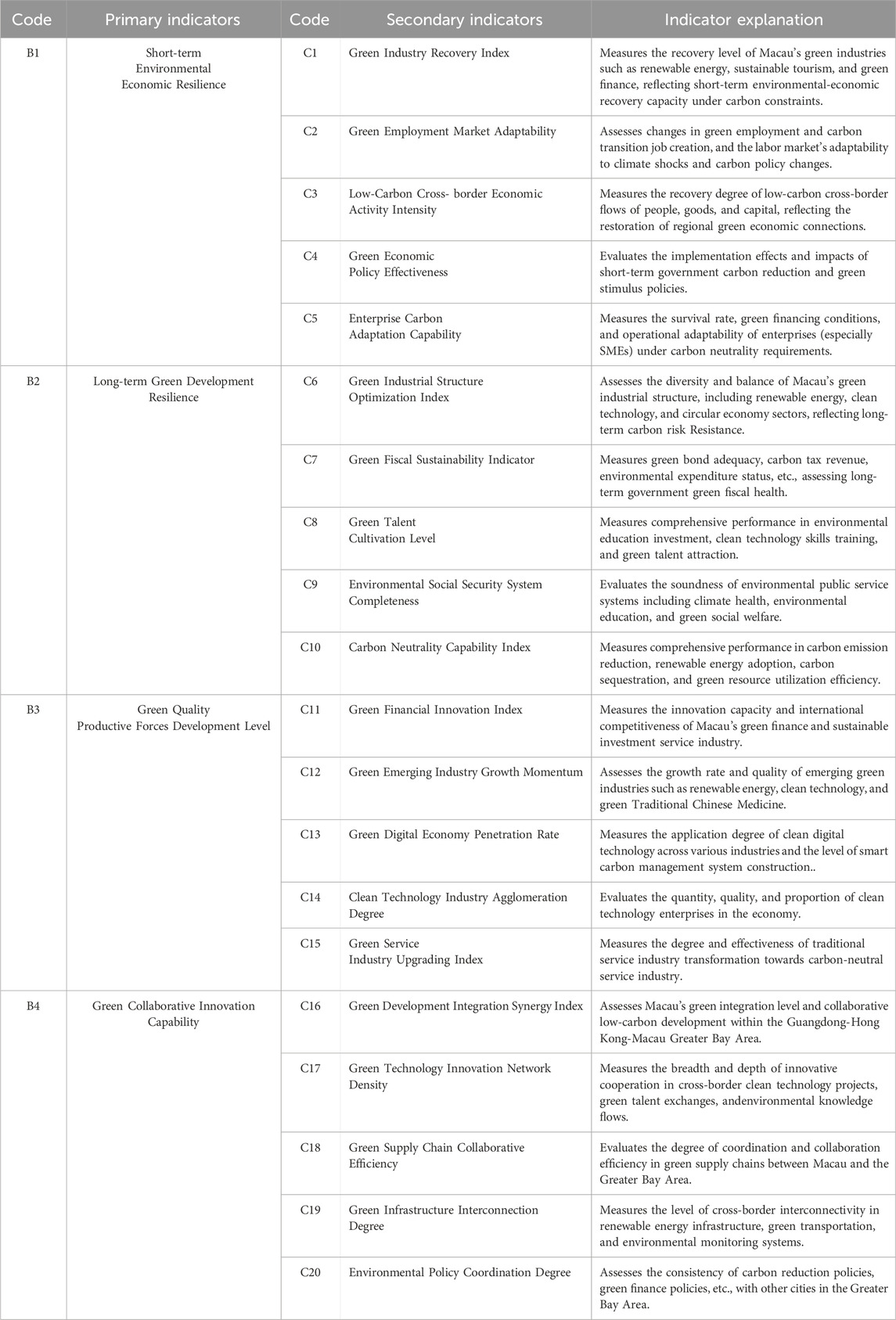
Table 1. Evaluation system for Macau’s environmental-economic resilience and green collaborative innovation.
The evaluation system for Macau’s environmental-economic resilience and green collaborative innovation constructed in this study adopts a multi-level indicator structure, comprising four primary indicators and 20 secondary indicators adapted for carbon neutrality goals. The primary indicators cover four dimensions: short-term environmental-economic resilience (B1), long-term green development resilience (B2), Green Quality Productive Forces development level (B3), and green collaborative innovation capability (B4), comprehensively reflecting the characteristics of Macau’s carbon-neutral economic diversification. Among these, short-term environmental-economic resilience (B1) measures Macau’s immediate carbon adaptation capability through five secondary indicators such as green industry recovery index and green employment market adaptability; long-term green development resilience (B2) assesses Macau’s long-term carbon-neutral adaptability through five secondary indicators including green industrial structure optimization index and carbon neutrality capability indicators; Green Quality Productive Forces development level (B3) encompasses five secondary indicators such as green financial service innovation index and green digital economy penetration rate, reflecting Macau’s development in carbon-neutral industries and clean technological innovation; green collaborative innovation capability (B4) includes five secondary indicators such as green development integration synergy index and green technology innovation network density, reflecting Macau’s level of collaborative carbon-neutral innovation within the Guangdong-Hong Kong- Macau Greater Bay Area. This study’s green evaluation system fully considers Macau’s environmental uniqueness while also reflecting its collaborative low-carbon development with the Greater Bay Area, providing a systematic analytical tool for comprehensively assessing Macau’s environmental-economic resilience and green innovation capabilities under carbon neutrality constraints.
3.2 Initial weight determination utilizing analytic hierarchy process
To thoroughly investigate the key influencing factors of Green Quality Productive Forces, Macau’s environmental-economic resilience, and the green collaborative innovation system under carbon neutrality constraints, this study employs expert judgment combined with AHP methodology specifically adapted for environmental contexts. The study invited 20 experts with extensive research experience to ensure comprehensive coverage and reduce potential bias. As detailed in Table 2, the expert panel encompasses environmental economists, policymakers, industry practitioners, carbon policy specialists, and regional innovation experts from universities, government departments, industry organizations, and research institutions across the Greater Bay Area. This diverse composition ensures balanced representation across theoretical, practical, and policy perspectives while maintaining specialized expertise in carbon-neutral micro-economic development.
Following the establishment of the aforementioned green evaluation indicator framework, this investigation employs the Analytic Hierarchy Process methodology to ascertain preliminary weightings for carbon-neutral development priorities (Li and Fei, 2025). The procedural implementation encompasses the following sequential phases.
3.2.1 Formulation of green hierarchical structural framework
Establish a stratified architectural framework for carbon-neutral analysis. Predicated upon the objective of evaluating Macau’s environmental-economic resilience and collaborative green innovation ecosystem, develop a hierarchical structural paradigm encompassing the objective stratum (carbon-neutral development), criterion stratum (environmental resilience dimensions), and indicator stratum (specific green metrics).
3.2.2 Weight calculation and consistency verification process
Based on the established green evaluation indicator framework, this study employs the Analytic Hierarchy Process (AHP) methodology to determine preliminary weightings for carbon-neutral development priorities. The implementation follows a systematic mathematical approach utilizing the formulas presented above. First, expert judgments are collected through pairwise comparisons using Saaty’s 1-9 scale to construct the judgment matrix as shown in Formula 1, where each element represents the relative importance between green indicators in the carbon-neutral context (Table 3). The initial weights are then calculated using the normalization method presented in Formula 2, which averages the normalized values across each row of the comparison matrix. To ensure the reliability of expert judgments, consistency verification is performed through the matrix operations described in Formula 3, computing the weighted sum vector. The maximum eigenvalue is calculated using Formula 4, which serves as the foundation for consistency assessment. Finally, the Consistency Index is computed using Formula 6, and the Consistency Ratio is determined through Formula 5, where RI represents the Random Consistency Index. When CR < 0.1, the judgment matrix demonstrates acceptable consistency, validating the reliability of the derived weights for Macau’s environmental-economic resilience and green collaborative innovation evaluation system.
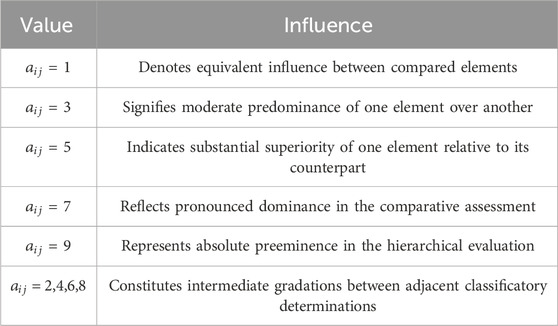
Table 3. Evaluative quantification for hierarchical echelons within the objective dendrogrammatic structure.
3.3 AHP-BWM integrated model for green weight robustness validation
The Best-Worst Method (BWM) is a multi-criteria decision-making method based on pairwise comparisons proposed by Rezaei in 2015 (Grošelj and Dolinar, 2025) (Yazdi et al., 2020). Compared with traditional analytic hierarchy process, BWM identifies the best (most important) and worst (least important) criteria in carbon-neutral evaluation systems, reducing the number of comparisons and improving consistency testing reliability, particularly suitable for handling complex multi-dimensional green assessment frameworks under carbon neutrality constraints. To enhance the robustness and reliability of weight determination, this study employs BWM as a sensitivity analysis tool in conjunction with AHP methodology, enabling methodological triangulation to validate the stability of carbon-neutral indicator rankings across different weighting approaches. This method initially determines the environmental criteria set C = {C1, C2, ., C20}, then identifies the best criterion CB and worst criterion CW based on expert knowledge in carbon-neutral economics, establishes linear programming models to solve optimal weights by constructing comparison vectors, as shown in the objective function of Formula 7. Constraint conditions ensure the rationality and consistency of green indicator weights, as shown in Formulas 8-10. Finally, reliability testing is conducted through consistency ratio, as shown in Formula 12, when CR ≤ 0.1, the expert judgment regarding carbon-neutral indicator priorities is considered to have good consistency. To integrate both methodological perspectives and minimize individual method bias, comprehensive weights are calculated by equally averaging AHP and BWM weights, as shown in Formula 13, where Wi represents the final comprehensive weight for indicator i, Wia is the AHP-derived weight, and Wib is the BWM-derived weight. This equal weighting approach ensures balanced representation of both methodological perspectives while providing robust weight assignments for Macau’s environmental-economic resilience evaluation framework. The comparative analysis between AHP and BWM results serves as a robustness test, with consistent rankings across both methods indicating stable and reliable weight assignments for the carbon-neutral evaluation system.
3.4 Construction of DEMATEL model for green systems
The Decision-Making Trial and Evaluation Laboratory (DEMATEL) framework provides a complementary analytical approach to address this deficiency in carbon-neutral contexts. DEMATEL, established as a systems science methodological paradigm, employs graph-theoretical principles and matrix-based computational instruments for comprehensive green systems analysis under carbon constraints (Bali et al., 2023). Through the examination of logical interdependencies among green system constituents, DEMATEL facilitates the construction of a direct environmental influence matrix C as shown in Formula 14, which is subsequently normalized using Formula 15 to derive the normalized direct-relation matrix X. The total relation matrix T is then computed through Formula 16, enabling the quantification of both direct and indirect relationships among green indicators. Based on this total relation matrix, the degree of environmental influence fi and degree of green susceptibility gi are calculated using Formulas 17, 18, leading to the determination of green centrality Hi through Formula 19 and environmental causality Ei via Formula 20. Finally, the comprehensive weights zi that integrate both AHP initial weights and DEMATEL influence relationships are derived using Formula 21, thereby facilitating the calculation of causality coefficients and centrality indices for each constituent element within the carbon-neutral analytical framework. This integrated AHP-DEMATEL model ultimately reveals the causal relationships between green elements and quantifies the relative importance of each environmental factor within Macau’s carbon-neutral economic system, providing robust analytical support for understanding complex green interdependencies in micro-economic contexts.
4 Results
4.1 Preliminary green weighting coefficient derivation utilizing AHP-BWM methodology
Following the establishment of the green evaluation indicator framework, this study implements a dual-methodology approach combining AHP and BWM to determine preliminary weightings for carbon-neutral development priorities and conduct comprehensive sensitivity analysis. Based on expert pairwise comparisons using Saaty’s one to nine scale, judgment matrices were constructed for all hierarchical levels, with initial weights calculated using the normalization method and consistency verified through maximum eigenvalue calculations. The consistency ratios at all levels were less than 0.1, indicating acceptable consistency of expert judgments.
According to Table 4, among primary indicators, long-term green development resilience dominates the evaluation system with a weight of 0.42312, significantly exceeding other dimensions and reflecting Macau’s strategic emphasis on sustainable carbon-neutral transformation. Green collaborative innovation capability and Green Quality Productive Forces development level are equally weighted at 0.22718, while short-term environmental-economic resilience receives the lowest priority at 0.12252. Among secondary indicators, the green industrial structure optimization index (C6) achieves the highest individual weight of 0.15870, followed by carbon neutrality capability index (C10) and green fiscal sustainability indicator (C7), both weighted at 0.09084.
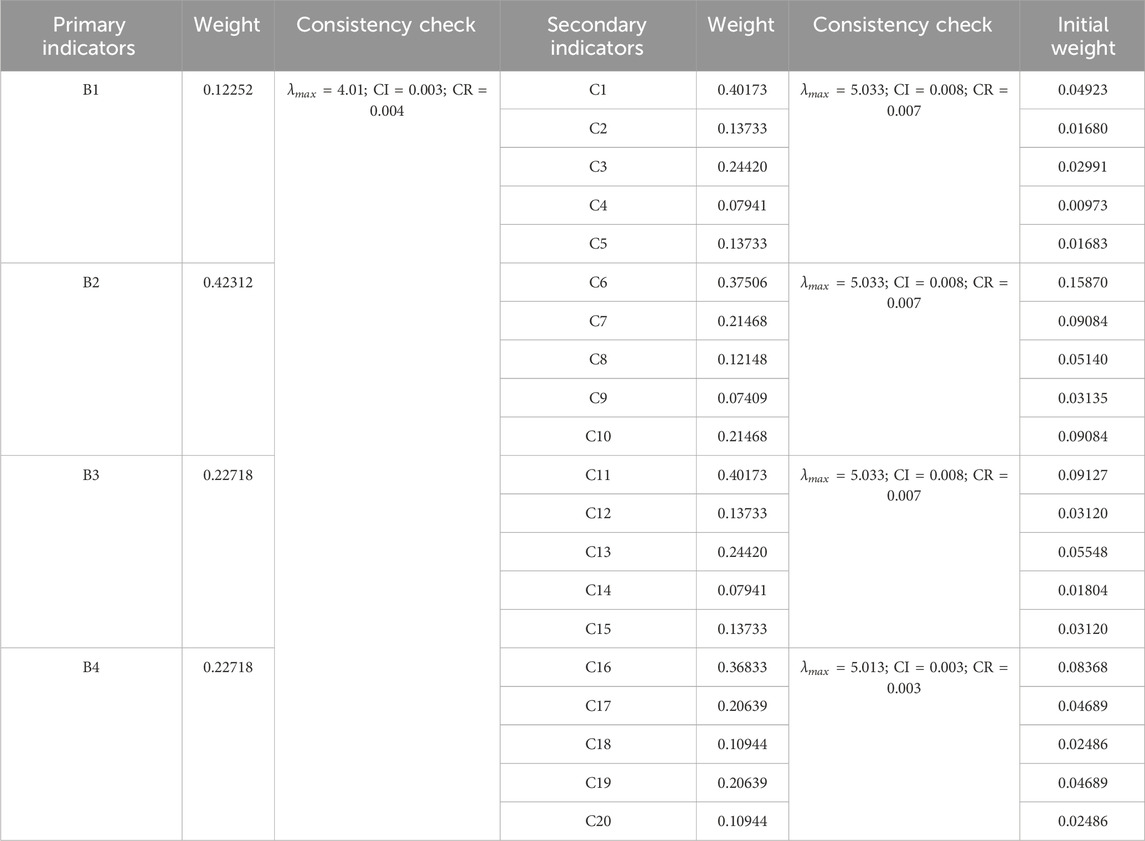
Table 4. Green indicator weights for the evaluation system of Macau’s environmental-economic resilience and green collaborative innovation.
To enhance weight determination robustness, BWM was employed as an independent validation mechanism. Following Rezaei’s methodology, experts identified the best criterion (Green Industrial Structure Optimization Index) and worst criterion (Green Economic Policy Effectiveness) based on their carbon-neutral development significance. Linear programming optimization yielded BWM weights with consistency ratios below 0.1, confirming reliable expert judgments. BWM results demonstrate substantial alignment with AHP findings while revealing subtle methodological differences, with the green industrial structure optimization index (C6) maintaining its dominant position.
Table 5 presents the comprehensive weights derived from averaging AHP and BWM results, providing balanced weight assignments that account for both methodological perspectives. The green industrial structure optimization index (C6) maintains its premier position with a comprehensive weight of 0.14750, followed by green financial innovation index (C11) at 0.10491 and carbon neutrality capability index (C10) at 0.09558. Sensitivity analysis reveals remarkable stability across methodological approaches, with correlation coefficients between AHP and BWM weights exceeding 0.85 for both primary and secondary indicators. Robustness testing through systematic expert judgment variations (±20% ranges) confirms weight stability, with variations not exceeding 8% for critical indicators across all sensitivity scenarios. This methodological triangulation validates the reliability of the carbon-neutral evaluation framework and demonstrates that core findings remain stable despite potential expert judgment fluctuations.
4.2 Calculation of comprehensive green weights for evaluation indicators based on DEMATEL
The computation process, which employed Equation 7–14 adapted for green systems analysis, generated the outcomes presented in Tables 6, 7. These findings delineate the influence potency, susceptibility metrics, centrality values, and causal coefficients for all twenty assessment parameters (illustrated in Figures 2, 3). These findings delineate the environmental influence potency, carbon susceptibility metrics, green centrality values, and environmental causal coefficients for all twenty carbon-neutral assessment parameters. Additionally, the analysis determined DEMATEL weightings for green factors and integrated importance factors for carbon-neutral development. The resultant data exposes the intricate interdependencies and comparative significance across the green evaluation criteria under carbon neutrality constraints. The research results indicate that the Green Industrial Structure Optimization Index (C6), Green Emerging Industry Growth Momentum (C12), and Green Financial Innovation Index (C11) have centrality values of 16.444, 16.362, and 15.927 respectively, highlighting their core positions in the carbon-neutral evaluation system. The Green Development Integration Synergy Index (C16), Environmental Policy Coordination Degree (C20), and Green Digital Economy Penetration Rate (C13) have cause degrees of 1 0.456, 1 0.358, and 1 0.213 respectively, ranking as the top three, indicating that these factors are key drivers in promoting the transformation of Macau’s green economic system toward carbon neutrality.
Comprehensive weight analysis further corroborates these findings, with the Green Industrial Structure Optimization Index (C6), Carbon Neutrality Capability Index (C10), and Green Development Integration Synergy Index (C16) having weights of 0.107, 0.072, and 0.071 respectively, ranking as the top three, emphasizing the strategic importance of green industrial diversification, carbon-neutral development, and regional green coordination in Macau’s environmental-economic development. The study also found that multiple indicators under Long-term Green Development Resilience (B2) generally have higher weights, highlighting the crucial role of long-term structural green factors in enhancing Macau’s environmental-economic resilience under carbon neutrality constraints.
In contrast, the weights of Green Economic Policy Effectiveness (C4) and Green Employment Market Adaptability (C2) are only 0.028 and 0.030 respectively, ranking lower, suggesting that short-term carbon policy interventions and green labor market flexibility have relatively limited impact in the overall carbon-neutral assessment framework. Additionally, the Enterprise Carbon Adaptation Capability (C5) and Green Employment Market Adaptability (C2) have the lowest cause degrees at −2.787 and −2.335 respectively, indicating that these indicators are more influenced by other green factors rather than being primary sources of environmental influence in the carbon-neutral system.
Case analysis reveals varying implementation success across sectors. Bank of China (Macau) developed green loans for gaming operators with preferential rates linked to carbon reduction outcomes, while Banco Nacional Ultramarino underwrote Macau’s first gaming industry green bond worth MOP 500 million in 2024. However, impact remains limited due to absent comprehensive carbon accounting systems. Galaxy Entertainment Group’s “Green Galaxy 2030″program achieved 23% carbon intensity reduction per visitor-night and catalyzed local green technology supplier development, demonstrating Clean Technology Industry Agglomeration (C14) in practice. Sands China’s AI-powered energy systems achieved 18% energy consumption reduction, validating Green Digital Economy Penetration Rate (C13) importance. The Guangdong-Hong Kong-Macau Green Finance Alliance established USD 2.1 billion cross-border green investment funds, with Macau contributing high-net-worth client management expertise while mainland and Hong Kong partners provide technical capabilities, illustrating successful Green Development Integration Synergy (C16) implementation.
5 Discussion
5.1 Discussion based on results
The research employed multi-criteria decision analysis to evaluate gaming-dependent micro-economies’ environmental-economic resilience and green collaborative innovation, revealing critical factors and interaction mechanisms that both validate and extend existing theoretical frameworks. The dominance of long-term green development resilience (weight 0.42312) provides empirical support for Martin and Sunley’s theoretical emphasis on evolutionary environmental resilience over short-term adaptive capacity (Asadzad et al., 2022). However, the findings extend their framework by demonstrating that gaming-dependent micro-economies exhibit even stronger preferences for transformative resilience mechanisms than diversified economies, contradicting assumptions that industrial concentration necessarily limits environmental adaptability. This gaming-specific finding challenges Lemke et al.'s regional resilience conceptualization, suggesting that concentrated micro-economies may achieve superior long-term environmental outcomes through “embedded transformation” rather than the horizontal diversification strategies emphasized in existing literature (Asadzad et al., 2022).
The equal weighting of green collaborative innovation capability and Green Quality Productive Forces development (both 0.22718) validates theoretical integration while revealing gaming-industry-specific patterns absent from previous research. Contemporary green innovation systems literature emphasizes institutional diversity as barriers to cross-border collaboration (Turner, 2022), yet gaming-dependent jurisdictions demonstrate superior collaborative capabilities precisely because their concentrated structure creates clear specialization advantages. The USD 2.1 billion Guangdong-Hong Kong-Macau Green Finance Alliance exemplifies how gaming industry capabilities - high-net-worth client management and international payment facilitation - contribute unique value to regional carbon-neutral networks, extending Turner’s complementarity theory into environmental contexts previously unexplored in micro-economic literature (Zhang et al., 2022).
The prominence of green industrial structure optimization index (0.107 comprehensive weight) fundamentally challenges existing green diversification theory applications to micro-economies. Georghiou et al.'s Malta case study emphasized comprehensive smart specialization across multiple sectors (Ning and Tang, 2025), while this research demonstrates that gaming-dependent micro-economies achieve superior green outcomes through “vertical integration” within concentrated industries. Galaxy Entertainment Group’s 23% carbon intensity reduction through integrated energy management systems validates this alternative pathway, contradicting assumptions that micro-economy green transformation requires wholesale industrial restructuring. This finding extends small island developing states research by demonstrating that institutional specialization, rather than economic diversification, can provide superior environmental resilience foundations (Prasad et al., 2025; Liu and Lin, 2024).
The consistently low weights of short-term environmental-economic resilience indicators contradict mainstream environmental economics literature emphasizing policy intervention effectiveness (Martin and Sunley, 2010). Green economic policy effectiveness (C4, weight 0.028) and green employment market adaptability (C2, weight 0.030) received minimal expert prioritization, challenging conventional assumptions about government intervention importance in environmental governance. This finding aligns with recent research on small jurisdiction adaptive capacity while extending theoretical understanding by demonstrating that gaming industry capital generation capabilities may substitute for traditional policy mechanisms in carbon-neutral transformation. The successful MOP 500 million green bond issuance by gaming industry operators validates market-driven approaches over regulatory interventions, supporting DeCaro et al.'s state-reinforced self-governance framework while revealing gaming-specific applications absent from existing environmental governance literature (Zhang and Tian, 2025).
The high causality degree of green digital economy penetration rate (C13, causality 1.213) extends contemporary research on digital technologies enabling green productivity transformations (He et al., 2025; Tang et al., 2023). However, gaming industry digital infrastructure provides unique advantages for clean technology deployment that general digital economy literature does not address. Sands China’s 18% energy consumption reduction through AI-powered systems demonstrates how gaming operations serve as testbeds for scalable environmental technologies, validating He et al.'s artificial intelligence empowerment framework while revealing gaming-industry-specific applications that accelerate broader green innovation diffusion (Tang et al., 2023).
The research findings contribute significantly to micro-economic carbon-neutral development theory by demonstrating that gaming dependency, rather than representing environmental liability, creates distinctive advantages for green transformation when properly leveraged. The dominance of structural factors over policy interventions validates recent small economy environmental governance research while extending theoretical understanding into gaming-dependent contexts previously unexplored (Zhang and Tian, 2025; DeCaro et al., 2025). These results challenge Liu and Lin’s emphasis on diversification necessity, instead supporting embedded transformation strategies that leverage concentrated industry advantages for broader environmental benefits (Wang and Chen, 2024).
Contemporary green collaborative innovation literature emphasizes geographical proximity and institutional similarity as collaboration foundations (Tartaruga et al., 2024; Pereira et al., 2023), yet Macau’s successful regional integration demonstrates how institutional differentiation - specifically gaming industry specialization - enhances rather than impedes collaborative environmental innovation. This finding extends Ning and Tang’s multidimensional proximity framework by revealing that functional specialization can substitute for geographical and institutional proximity in green innovation networks, providing new theoretical perspectives for understanding micro-economy integration into larger environmental ecosystems (Tartaruga et al., 2024).
Comparative analysis with other micro-economies reveals distinctive patterns in Macau’s carbon-neutral development approach. Unlike Singapore’s comprehensive smart nation strategy emphasizing diversified green technology across multiple sectors (Ning and Tang, 2025), Macau’s concentrated gaming industry creates advantages for sector-embedded transformation. Singapore pursues broad-based decarbonization through systematic policy interventions, contrasting with this study’s finding that policy effectiveness receives minimal weight in gaming-dependent jurisdictions.
Hong Kong’s carbon neutrality strategy demonstrates similar regional integration patterns through cross-border electricity trading mechanisms (Sehrsweeney and Fischer, 2022), aligning with this study’s emphasis on regional coordination. However, Hong Kong’s economic diversification across financial services and logistics differs from Macau’s gaming concentration, suggesting specialized micro-economies require differentiated integration strategies leveraging unique sectoral advantages.
European micro-economies such as Monaco emphasize sustainable luxury tourism transformation (Xiang and Zhou, 2023), sharing similarities with Macau’s gaming and hospitality development. However, Monaco’s absence of large-scale industrial operations suggests gaming-dependent jurisdictions face distinctive challenges in carbon accounting and green technology deployment that other micro-economies do not encounter.
5.2 Theoretical contributions and green policy implications
Based on these integrated theoretical and empirical findings, gaming-dependent micro-economies require specialized policy approaches that leverage existing institutional advantages while addressing specific constraints. Given Macau’s unique “One Country, Two Systems” framework and established gaming regulatory infrastructure, carbon-neutral transformation should build upon existing policy mechanisms rather than creating parallel structures.
Gaming industry green transformation should build upon Macau’s existing Gaming Inspection and Coordination Bureau oversight mechanisms, with mandatory carbon disclosure requirements integrated into current gaming license renewal processes scheduled for 2027-2032. This approach leverages established regulatory relationships while creating enforceable carbon accountability. Specific implementation includes integrating carbon intensity metrics into existing gaming revenue reporting systems administered by the Statistics and Census Service, establishing green technology investment tax credits through the Financial Services Bureau’s existing business tax framework offering 200% depreciation allowances for gaming operators investing in renewable energy systems, and creating gaming industry carbon management certification programs through the Institute for Tourism Studies, building upon existing hospitality training infrastructure to develop specialized carbon-neutral casino management expertise.
Green financial policy should address Macau’s monetary authority framework constraints that limit independent green finance development, necessitating coordination with Guangdong Province’s green finance pilot zones. The Monetary Authority of Macao should establish specialized green investment facilitation mechanisms within existing cross-border financial cooperation agreements signed in 2019–2021. Implementation includes expanding the existing RMB clearing bank arrangements to include green bond settlement services for gaming industry issuers, building upon Bank of China (Macau)’s established infrastructure, developing gaming industry green supply chain financing through existing trade finance mechanisms with mainland counterparts while leveraging Macau’s unique customs arrangements under CEPA, and establishing gaming industry carbon offset trading connections with Guangdong’s carbon market through existing Greater Bay Area financial integration protocols, utilizing Macau’s international payment processing advantages for cross-border carbon credit transactions.
Regional collaboration policy should recognize Macau’s limited research infrastructure and focus on strategic positioning within existing Greater Bay Area innovation coordination mechanisms established through the 2019 Outline Development Plan. Rather than developing comprehensive green innovation capabilities, Macau should leverage its institutional advantages by establishing gaming industry green technology testing zones within existing Industrial Development Bureau special economic area frameworks, offering gaming operators regulatory sandboxes for carbon management technologies while contributing data to regional green innovation databases. Additionally, sustainable luxury services expertise should be developed through existing Institute for Tourism Studies programs, creating specialized certification programs for carbon-neutral high-end hospitality that serve broader Greater Bay Area premium tourism markets. Macau’s existing international education partnerships, including University of Saint Joseph and University of Macau international programs, should be utilized to establish green finance and sustainable gaming management academic exchanges, creating specialized human capital that serves regional carbon-neutral development needs while maintaining Macau’s educational service export advantages.
5.3 Research limitations and future research directions
This study has several limitations that should be acknowledged. First, the research lacks comprehensive cross-regional comparative analysis due to data availability constraints and institutional framework differences across micro-economies. The study focuses on Macau as a single case rather than conducting systematic empirical comparison with other gaming-dependent or micro-economy jurisdictions. Second, the reliance on expert judgment introduces subjectivity despite methodological controls. Third, the analysis provides a static snapshot rather than capturing dynamic evolution of carbon-neutral systems. Fourth, empirical validation remains limited, with case examples from individual gaming operators rather than comprehensive sector-wide assessment. Future research should address these limitations through: (1) multi-case comparative studies across different micro-economy types; (2) longitudinal analysis capturing system evolution over time; (3) expanded quantitative data collection for cross-regional validation; and (4) comprehensive empirical testing of proposed frameworks across multiple jurisdictions.
6 Conclusion
This study addressed how micro-economies like Macau can simultaneously enhance environmental-economic resilience, develop Green Quality Productive Forces, and strategically integrate into regional collaborative green innovation networks under carbon neutrality constraints. Through an integrated theoretical framework and multi-criteria decision analysis methodology combining AHP, BWM, and DEMATEL approaches, this study identified the relative importance and complex interactions among factors influencing Macau’s green development trajectory under dual carbon goals.
The methodological innovation of integrating BWM for robustness validation with AHP and DEMATEL analysis provided enhanced reliability for weight determination in carbon-neutral evaluation systems. Correlation coefficients exceeding 0.85 between AHP and BWM approaches confirmed the stability of indicator rankings, while sensitivity analysis demonstrated weight resilience across expert judgment variations. The comprehensive theoretical foundation established through systematic literature review linked established frameworks in environmental-economic resilience, transformative resilience theory, and green collaborative innovation dynamics to micro-economy contexts, addressing previous research gaps in gaming-dependent jurisdictions.
Research findings reveal that enhancing Macau’s environmental-economic resilience depends primarily on strengthening long-term green structural factors—particularly green industrial diversification (0.107 comprehensive weight) and carbon neutrality capacity (0.072)—rather than short-term policy interventions. Green collaborative innovation capability emerges as substantially more important than conventionally assumed in carbon-neutral pathways, with regional integration coordination achieving significant weight (0.071). Comparative analysis with Singapore’s diversified smart nation approach, Hong Kong’s comprehensive renewable infrastructure strategy, and Monaco’s luxury tourism transformation demonstrates that gaming-dependent micro-economies require specialized sector-embedded transformation strategies rather than horizontal diversification models.
The analysis demonstrates that Macau’s carbon-neutral development strategy should leverage existing institutional advantages through Gaming Inspection and Coordination Bureau integration, Monetary Authority coordination with Greater Bay Area green finance mechanisms, and strategic positioning within regional innovation networks. These findings challenge conventional assumptions about micro-economy limitations, revealing how industrial concentration can accelerate rather than impede carbon-neutral transformation when strategically managed through institutional specialization.
This research contributes to micro-economy carbon-neutral development theory by demonstrating gaming industry assets constitute foundational elements for green technology deployment rather than obstacles to overcome. The study provides policymakers with evidence-based priorities that build upon existing regulatory frameworks while acknowledging unique constraints of gaming-dependent jurisdictions within regional carbon-neutral ecosystems.
Future studies should incorporate expanded comparative frameworks across different micro-economy types, longitudinal analysis capturing dynamic evolution of carbon-neutral systems, and predictive modeling for forward-looking policy development. These directions would deepen understanding of environmental-economic resilience patterns generalizable beyond gaming-dependent contexts while addressing distinctive transformation pathways for specialized micro-economies pursuing carbon neutrality within regional integration frameworks.
Data availability statement
The original contributions presented in the study are included in the article/Supplementary Material, further inquiries can be directed to the corresponding author.
Author contributions
SL: Investigation, Data curation, Supervision, Writing – review and editing, Methodology, Conceptualization, Software, Resources, Visualization, Formal Analysis, Validation, Writing – original draft. HZ: Funding acquisition, Writing – review and editing, Writing – original draft, Project administration.
Funding
The author(s) declare that financial support was received for the research and/or publication of this article. The Research was supported by Macao Polytechnic University (RP/FCHS-02/2025).
Conflict of interest
The authors declare that the research was conducted in the absence of any commercial or financial relationships that could be construed as a potential conflict of interest.
Generative AI statement
The author(s) declare that no Generative AI was used in the creation of this manuscript.
Any alternative text (alt text) provided alongside figures in this article has been generated by Frontiers with the support of artificial intelligence and reasonable efforts have been made to ensure accuracy, including review by the authors wherever possible. If you identify any issues, please contact us.
Publisher’s note
All claims expressed in this article are solely those of the authors and do not necessarily represent those of their affiliated organizations, or those of the publisher, the editors and the reviewers. Any product that may be evaluated in this article, or claim that may be made by its manufacturer, is not guaranteed or endorsed by the publisher.
Supplementary material
The Supplementary Material for this article can be found online at: https://www.frontiersin.org/articles/10.3389/fenvs.2025.1642225/full#supplementary-material
References
Asadzadeh, A., Khavarian-Garmsir, A. R., Sharifi, A., Salehi, P., and Kötter, T. (2022). Transformative resilience: an overview of its structure, evolution, and trends. Sustainability 14 (22), 15267. doi:10.3390/su142215267
Bali, S., Bali, V., Gaur, D., Rani, S., Kumar, R., Chadha, P., et al. (2023). A framework to assess the smartphone buying behaviour using DEMATEL method in the Indian context. Ain Shams Eng. J. 14 (11), 102129. doi:10.1016/j.asej.2023.102129
Cai, K., Sun, C., Wang, H., Song, Q., Wang, C., and Wang, P. (2022). The potential challenge for the effective GHG emissions mitigation of urban energy consumption: a case study of Macau. Environ. Impact Assess. Rev. 93, 106717. doi:10.1016/j.eiar.2021.106717
Capoani, L., Fantinelli, M., and Giordano, L. (2025). The concept of resilience in economics: a comprehensive analysis and systematic review of economic literature. Continuity and Resilience Review.
Carrilho-Nunes, I., and Catalão-Lopes, M. (2025). Factors influencing the transition to a low-carbon energy paradigm: a systemic literature review. Green Low-Carbon Econ. 3 (1), 1–17. doi:10.47852/bonviewglce42021691
Cheng, Y., Elsayed, E. A., and Huang, Z. (2022). Systems resilience assessment. Qual. Reliab. Eng. Int. 38 (4), 1775–1790.
Cobbinah, J., Osei, A., and Amoah, J. O. (2025). Innovating for a greener future: do digital transformation and innovation capacity drive enterprise green total factor productivity in the knowledge economy? J. Knowl. Econ., 1–39. doi:10.1007/s13132-025-02673-1
Davis, A. A. K. (2025). A comprehensive analysis of climate resilience strategies for small island developing nations. Missouri University of Science and Technology.
DeCaro, D. A., Schlager, E. C., and Boamah, E. F. (2025). The State-reinforced self-governance framework: conceptualizing and diagnosing legal and other institutional foundations of adaptive and transformative environmental governance. Ecol. Soc. 30 (2), art1. doi:10.5751/es-15567-300201
Fabrizi, A., Fiorelli, C., and Meliciani, V. (2025). The role of green networks for environmental innovation in European regions. J. Industrial Bus. Econ., 1–32. doi:10.1007/s40812-024-00339-8
Farlynda, T. (2024). “Small island sustainability: a comparative analysis of Bali and Palau Islands,” in Sustainable development across pacific islands: Lessons, challenges, and Ways forward (Singapore: Springer Nature), 147–170.
Gao, X., and Li, S. (2025). A dynamic evolution and spatiotemporal convergence analysis of the coordinated development between new quality productive forces and China's carbon total factor productivity. Sustainability 17 (7), 3137. doi:10.3390/su17073137
Georgeson, L., Maslin, M., and Poessinouw, M. (2017). The global green economy: a review of concepts, definitions, measurement methodologies. Glob. Environ. Change 44, 57–69.
Georghiou, L., Elvira Uyarra, A., Saliba Scerri, R., Castillo, N., and Cassingena Harper, J. (2014). Adapting smart specialisation to a micro-economy--the case of Malta. Eur. J. Innovation Manag. 17 (4), 428–447. doi:10.1108/ejim-03-2014-0026
Grošelj, P., and Dolinar, G. (2025). “A comparative analysis of MCDM methods based on pairwise comparison: AHP, BWM and FUCOM,” in XXI international may Conference on strategic management--IMCSM25 Proceedings, 256–266.
Hamidah, M., Hasmadi, I. M., Chua, L. S. L., Yong, W. S. Y., Lau, K. H., Faridah-Hanum, I., et al. (2022). Development of a protocol for Malaysian important plant areas criterion weights using multi-criteria decision making-analytical hierarchy process (MCDM-AHP). Glob. Ecol. Conservation 34, e02033. doi:10.1016/j.gecco.2022.e02033
He, X., Ruan, J., and Bian, C. (2025). Development of artificial intelligence empowering green innovation: a case study of the Yangtze River Economic Belt. Environ. Dev. Sustain., 1–29. doi:10.1007/s10668-025-06019-4
Joyce, G. (2023). Tourism's Post-covid-19 Reset: opportunities for sustainability in Coastal and marine tourism. University of Auckland.
Lemke, L. K. G., Sakdapolrak, P., and Trippl, M. (2023). Unresolved issues in regional economic resilience: Conceptual ways forward. Prog. Hum. Geogr. 47 (5), 699–717. doi:10.1177/03091325231191242
Leung, C. K., and Ko, J. (2025). Governing sustainability: Why democracy enhances social ESG but weakens environmental and governance outcomes. Environment, 1. Innovation and Management.
Li, T., and Fei, L. (2025). Exploring obstacles to the use of unmanned aerial vehicles in emergency rescue: a BWM-DEMATEL approach. Technol. Soc. 81, 102863. doi:10.1016/j.techsoc.2025.102863
Li, L., Zeng, Y., and Xia, D. (2024). How does the digital innovation ecosystem enable green regional development? A dynamic Qca study in China. Systems 12 (12), 551. doi:10.3390/systems12120551
Liu, C., and Lin, Y. (2024). Macau's sustainability and diversification. Bus. Econ. 59 (1), 53–57. doi:10.1057/s11369-022-00260-9
Liu, J., Lo, K., Mah, D., and Guo, M. (2021). Cross-border governance and sustainable energy transition: the case of the guangdong-Hong Kong-macao greater bay area. Curr. Sustainable/Renewable Energy Rep. 8 (2), 101–106. doi:10.1007/s40518-021-00178-4
Luo, Y., Wang, W., and Zhao, D. (2022). The impacts of carbon emission trading mechanism on the power transition pathway-taking Guangdong-Hong Kong-Macao Greater Bay Area as an example. J. Clean. Prod. 330, 129894. doi:10.1016/j.jclepro.2021.129894
Martin, R., and Sunley, P. (2010). The place of path dependence in an evolutionary perspective on the economic landscape. Handb. Evol. Econ. Geogr. 1, 62–92.
Ning, X., and Tang, Y. (2025). Evolution of collaborative relationships in green building technology innovation: a multidimensional proximity perspective. IEEE Trans. Eng. Manag. 72, 1454–1470. doi:10.1109/tem.2025.3557031
Pereira, V., Bamel, U., Temouri, Y., Budhwar, P., and Del Giudice, M. (2023). Mapping the evolution, current state of affairs and future research direction of managing cross-border knowledge for innovation. Int. Bus. Rev. 32 (2), 101834. doi:10.1016/j.ibusrev.2021.101834
Prasad, R. D., Chand, D. A., Lata, S. S., and Kumar, R. S. (2025). Beyond energy access: how renewable energy fosters resilience in island communities. Resources 14 (2), 20. doi:10.3390/resources14020020
Rossoni, A. L., de Vasconcellos, E. P. G., and de Castilho Rossoni, R. L. (2024). Barriers and facilitators of university-industry collaboration for research, development and innovation: a systematic review. Manag. Rev. Q. 74 (3), 1841–1877. doi:10.1007/s11301-023-00349-1
Sehrsweeney, M., and Fischer, A. P. (2022). Governing ecosystem adaptation: an investigation of adaptive capacity within environmental governance networks. Environ. Sci. and Policy 134, 46–56. doi:10.1016/j.envsci.2022.03.021
Song, Y., Zhang, H., and Chen, G. (2022). Typical pathway to carbon neutrality for urban smart energy systems—case study of Macao Special Administrative Region. Bull. Chin. Acad. Sci. Chin. Version 37 (11), 1650–1663.
Tang, W., Mai, L., and Li, M. (2023). Green innovation and resource efficiency to meet net-zero emission. Resour. Policy 86, 104231. doi:10.1016/j.resourpol.2023.104231
Tartaruga, I., Sperotto, F., and Carvalho, L. (2024). Addressing inclusion, innovation, and sustainability challenges through the lens of economic geography: Introducing the hierarchical regional innovation system. Geogr. Sustain. 5 (1), 1–12. doi:10.1016/j.geosus.2023.10.002
Turner, P. (2022). “The Origins of complementarity,” in Complementarity in organizations: strategy, Leadership, management, Talent and Engagement in the Fourth industrial Revolution (Springer International Publishing), 59–86.
Ullah, S., Yushi, J., and Huang, Y. (2025). Firm carbon orientation and green innovation: does green intellectual capital matter? J. Intellect. Cap. 26 (4), 968–1012. doi:10.1108/jic-12-2024-0412
Wang, Q., and Chen, X. (2024). Can new quality productive forces promote inclusive green growth: evidence from China. Front. Environ. Sci. 12, 1499756. doi:10.3389/fenvs.2024.1499756
Wang, K. L., Zhang, F. Q., Xu, R. Y., Miao, Z., Cheng, Y. H., and Sun, H. P. (2023). Spatiotemporal pattern evolution and influencing factors of green innovation efficiency: a China's city level analysis. Ecol. Indic. 146, 109901. doi:10.1016/j.ecolind.2023.109901
Wei, H., and Zheng, C. (2024). Spatial network structure and influencing factors of carbon emission intensity in Guangdong-Hong Kong-Macao greater bay area. Front. Environ. Sci. 12, 1380831. doi:10.3389/fenvs.2024.1380831
Xiang, S., and Zhou, W. (2023). Challenges and Countermeasures of marine ecological and environmental governance in the guangdong-Hong Kong-Macao greater bay area-based on the perspective of multi-level governance.
Yazdi, M., Khan, F., Abbassi, R., and Rusli, R. (2020). Improved DEMATEL methodology for effective safety management decision-making. Saf. Sci. 127, 104705. doi:10.1016/j.ssci.2020.104705
Zhai, T., Tam, P. S., Jiang, Z., Yang, C., and Wang, L. (2025). Sustainable tourism-driven growth in Macao: a comprehensive analysis of short-run and long-run relationships. Urban, Plan. Transp. Res. 13 (1), 2439495. doi:10.1080/21650020.2024.2439495
Zhang, H., and Tian, M. (2025). Shadows of Uncertainty: Unraveling the impact of economic policy Uncertainty on tourism-driven energy consumption in Macau. Sustainability 17 (8), 3716. doi:10.3390/su17083716
Zhang, T., Yu, W., and Shen, D. (2022). Evaluating environmental outcome and process-adaptivity of regional collaboration: an empirical study from China. J. Environ. Manag. 319, 115773. doi:10.1016/j.jenvman.2022.115773
Keywords: carbon neutrality, green resilience, green quality productive forces, multi-criteria decision analysis, macao
Citation: Lin S and Zhang H (2025) Carbon neutrality-oriented green resilience and low-carbon innovation in Macau: a multi-criteria assessment framework for sustainable regional development. Front. Environ. Sci. 13:1642225. doi: 10.3389/fenvs.2025.1642225
Received: 06 June 2025; Accepted: 08 September 2025;
Published: 26 September 2025.
Edited by:
Hélder Tiago Da Silva Lopes, University of Minho, PortugalReviewed by:
Sanglin Zhao, Hunan University of Finance and Economics, ChinaYinghuan Lian, Quzhou University, China
Copyright © 2025 Lin and Zhang. This is an open-access article distributed under the terms of the Creative Commons Attribution License (CC BY). The use, distribution or reproduction in other forums is permitted, provided the original author(s) and the copyright owner(s) are credited and that the original publication in this journal is cited, in accordance with accepted academic practice. No use, distribution or reproduction is permitted which does not comply with these terms.
*Correspondence: Hongfeng Zhang, aGZlbmd6aGFuZ0BtcHUuZWR1Lm1v
 Shuaijun Lin
Shuaijun Lin Hongfeng Zhang1*
Hongfeng Zhang1*